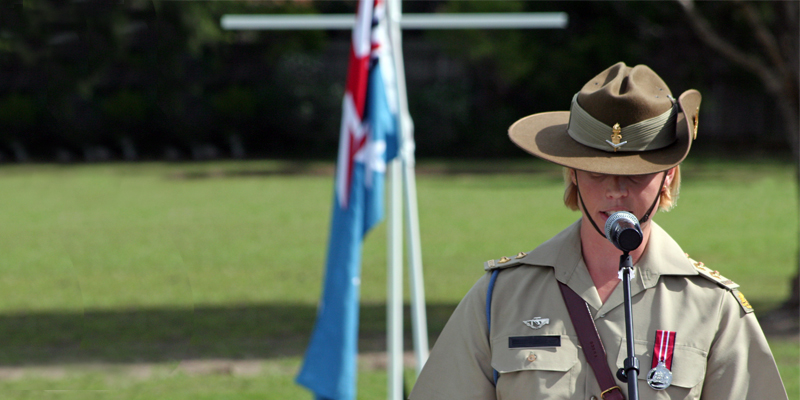Army Reservists in the firing line from unsupportive managers
By Candy Gibson
 SOCIETY AND CULTURE An Australian Army officer at a remembrance ceremony.
SOCIETY AND CULTURE An Australian Army officer at a remembrance ceremony.Australians love their war heroes but a new national survey of 800 managers shows that sentiment doesn’t extend to part-time soldiers on their payroll, many of whom experience indifference, hostility and discrimination in the workplace.
Almost one in five managers indicated their organisation would likely give “low or very low support” to an Army reservist taking leave for training and combat duties.
The study, led by UniSA sociologist Associate Professor Brad West, and employment relations Associate Professor Dr Josh Healy from the University of Sydney, has been recently published by the Australian Army Research Centre.
Interviews with 60 Army reservists based at three different locations in Sydney, Brisbane and Townsville also revealed that middle managers in both the private sector and government, consistently sought to deny Defence leave requests, largely irrespective of the organisation’s official stance.
This contrasted with a generally positive view of Army reservists as employees, with most employers believing they were hard workers (80%) and creative problem solvers (70%).
The study revealed a large mismatch between employers’ public declarations of support for Army reservists and the actual tensions that occurred in workplaces.
A novel feature of the survey is that managers were asked to consider a hypothetical reservist called John and indicate how they would respond in a range of common workplace situations if John was on their payroll. The 60 reservists interviewed provided feedback from their actual experiences in the workplace.
Support for the part-time soldiers differed between industries, with managers in public administration, mining and healthcare sectors reporting a “significantly higher willingness” to support reservists’ service. Part of this is attributed to large numbers of reservists and veterans already working in these sectors.
“One factor contributing to tensions in the less supportive workplaces was an incorrect perception among many managers that military skills were not useful in the civilian workplace,” Assoc Prof West says.
Almost 40% of managers said military training and experience would have “low or very low relevance” in their organisation.
One reservist interviewed in the focus groups provided this feedback:
“Management loves to put the word forward, super supportive, love the Reserves, Defence Force, yeah let’s go, but the second it comes to jumping on a course, they question everything. They question the importance of the Defence Force and that course. They question whether I really need to be going to that course.”
Assoc Prof Healy says managers’ own personal attributes are generally not the main drivers of differences in their perceptions of reservists.
“We didn’t find different attitudes because of managers’ age, or sex, or even their own education levels,” Prof Healy says.
The focus groups revealed that the support that reservists receive in the workforce is not only related to attitudes towards the military, but specifically to the role of reservists.
“There is a lack of understanding among employers. They think it’s either a holiday or a hobby or just something fun to go on your days off, or a cash grab,” one reservist said. “When I try to explain to them that if something big happens in the Pacific tomorrow, I might have to go frontline, they don’t accept that.”
Despite the lack of support from managers, most reservists said they were motivated by a volunteer ethos and serving their country.
“It’s not the money or the lifestyle but that fact that I am helping Australia’s national interests and contributing to something larger than myself,” according to one interviewee.
More information on the project, including recommendations stemming from the study, is available on the Australian Army Research Centre (AARC) website.
The report is part of the Occasional Papers series produced by the AARC, which publishes original, high-quality research that generates informed discussion and new ideas that contribute to Army modernisation and the future of land power.
Other Stories
- $2.5m gift powers new Aboriginal Knowledges Centre
- Interest rate cuts, lower inflation, trade shifts – will Australia’s economy find its stride in 2025?
- Myth busted: How long healthy habits actually take to set in
- Watch shows together, talk about them and have dance parties: how to rebalance screen use after the holidays
- From the Vice Chancellor: The collective power of individuals
- Achievements and Announcements
- Army Reservists in the firing line from unsupportive managers
- Record number of UniSA students to explore the Indo-Pacific on New Colombo Plan Scholarships
- Peer Support Group a shining light for refugee students
- In Pictures: MOD.’s new exhibition rethinks time, memory and mortality




